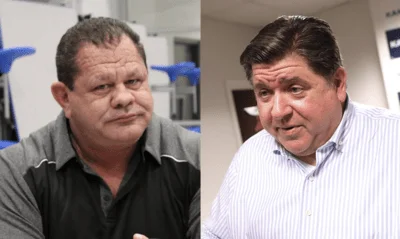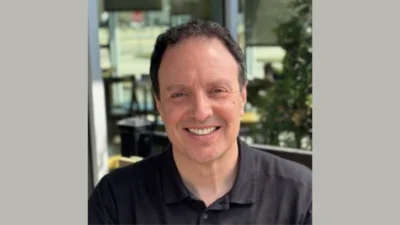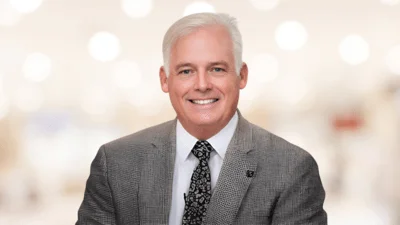When Erika Aleman began training for marathons in 2015, she struggled to embrace her running coach’s mantra: “Take it one mile at a time.”
New to running, all she could think about was crossing the finish line.
“I was frustrated, but my coach was right. When I focused on the finish, I was overwhelmed,” says Erika, now 43-years-old, who saw her times improve and her love of running grow as she changed her approach.
Now, seven years later, Erika is again turning to that philosophy, but this time for a different type of challenge – to guide her through treatment for breast cancer.
On Sunday, October 9, Erika completed the Chicago Marathon, a race she trained for through 16 rounds of neoadjuvant chemotherapy combined with immunotherapy. On Friday, October 14, just five days after the marathon, she underwent a bilateral mastectomy for stage II triple-negative breast cancer (TNBC).
“When I was diagnosed, I felt like I lost control of my life,” says Erika of her diagnosis. “I didn’t understand how this could happen. Everything went dark for me.”
Scared for her life and what the diagnosis meant for her two daughters, Erika also worried she would have to stop running, something that had become her personal form of therapy.
“Running is my ‘me time’ and the place where I can be in my own head,” she says. “Any trouble in my life, I’d grab my shoes and head outside. I couldn’t lose that, not now.”
Erika sought treatment at the Lurie Cancer Center at Northwestern Medicine where she met oncologist Regina Stein, MD, and breast surgeon Swati Kulkarni, MD, who both supported her in continuing to run and remaining active.
“In our first appointment, Dr. Stein told me, ‘You will see the light at the end of the tunnel,’ and then she said it was okay to run,” said Erika. “That’s when I promised myself that I would survive this. Dr. Stein gave me hope when I needed it.”
Recalling their first meeting, Dr. Stein remembers her patient’s initial fear, but then that fear turned into a resolve to beat cancer. “I outlined what treatment she would need to achieve the goal of curing her cancer. Erika very confidently said a phrase in Spanish that I know very well. She said ‘así será,’ which means ‘that is what it will be.’ It’s a promise,” says Dr. Stein. “When she said that, I knew not just what we were trying to achieve, but that it would happen.”
As her treatment progressed, Erika never stopped running or training. When it came time to meet with her surgeon, Erika had a surprising request – could she have her surgery after she ran the Chicago Marathon?
“I just remember being so impressed that she had been training while undergoing chemotherapy and planned to run a marathon,” said Dr. Kulkarni. “My first reaction was ‘wow!” and then I told her absolutely.”
Erika’s physicians came up with a treatment plan that had the best odds of eradicating the cancer but was timed so she could still train and run the marathon without disrupting the necessary timeline.
“I always tell my patients, as much as you can, do the things you enjoy doing, do the things you have always done,” says Dr. Kulkarni. “Don’t stop doing things just because you’re undergoing treatment. It’ll help you get through it. For Erika, that was running.”
Erika says she relied on her faith, her family and her running to carry her through chemo and immunotherapy. And she never forgot her coach’s earlier words: Trust the process, take it one step at a time.
“I had to focus on what I could control and that was my running,” says Erika. “On the days I couldn’t run, then I would walk. Sometimes, I would only be able to walk around my living room, but I did it. I never stopped.”
Throughout treatment, Erika has relied on the support of her two daughters, Abby (16) and Marcia (21), who she calls her biggest cheerleaders and the reason she originally began running.
“I started running to prove to my daughters that you can accomplish anything you put your mind to,” says Erika, who is a single mom. “I told myself I would survive this for them. I am strong for my daughters, so they don’t have to worry about this.”
At the marathon, Erika’s physicians, Dr. Stein and Dr. Kulkarni, were both excited to be along the course, cheering on the patient they call an inspiration.
“We can often think we’re running away from something, but Erika was running toward something,” says Dr. Stein. “She was running towards her cure, towards her life, towards her family. She was running towards the end of this, and she has run faster and stronger with each cycle.”
Reflecting on what was her 13th marathon, Erika says yesterday’s race was her slowest, but also her most important.
“Life will punch you in the gut, but it doesn’t mean you should stop breathing,” says Erika. “You don’t get to pick and choose what happens to you, but you get to choose how to respond. I chose life, I chose to fight, I chose to embrace my reality and to keep going forward with my head held high. Yesterday, I ran THE BEST MARATHON OF my life.”
Six days following her surgery, Erika got the phone call she been waiting for since her cancer diagnosis: “Dr. Stein called me and told me I’m cancer-free. What’s better than that? We need to celebrate life. I’m a lucky one.”
Life will punch you in the gut, but it doesn’t mean you should stop breathing.
Original source can be found here.





 Alerts Sign-up
Alerts Sign-up